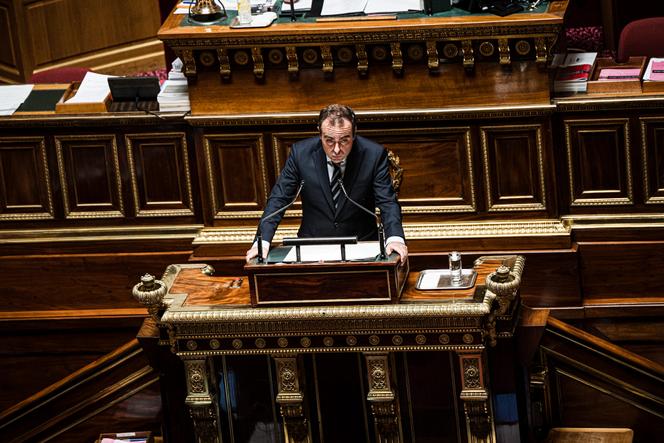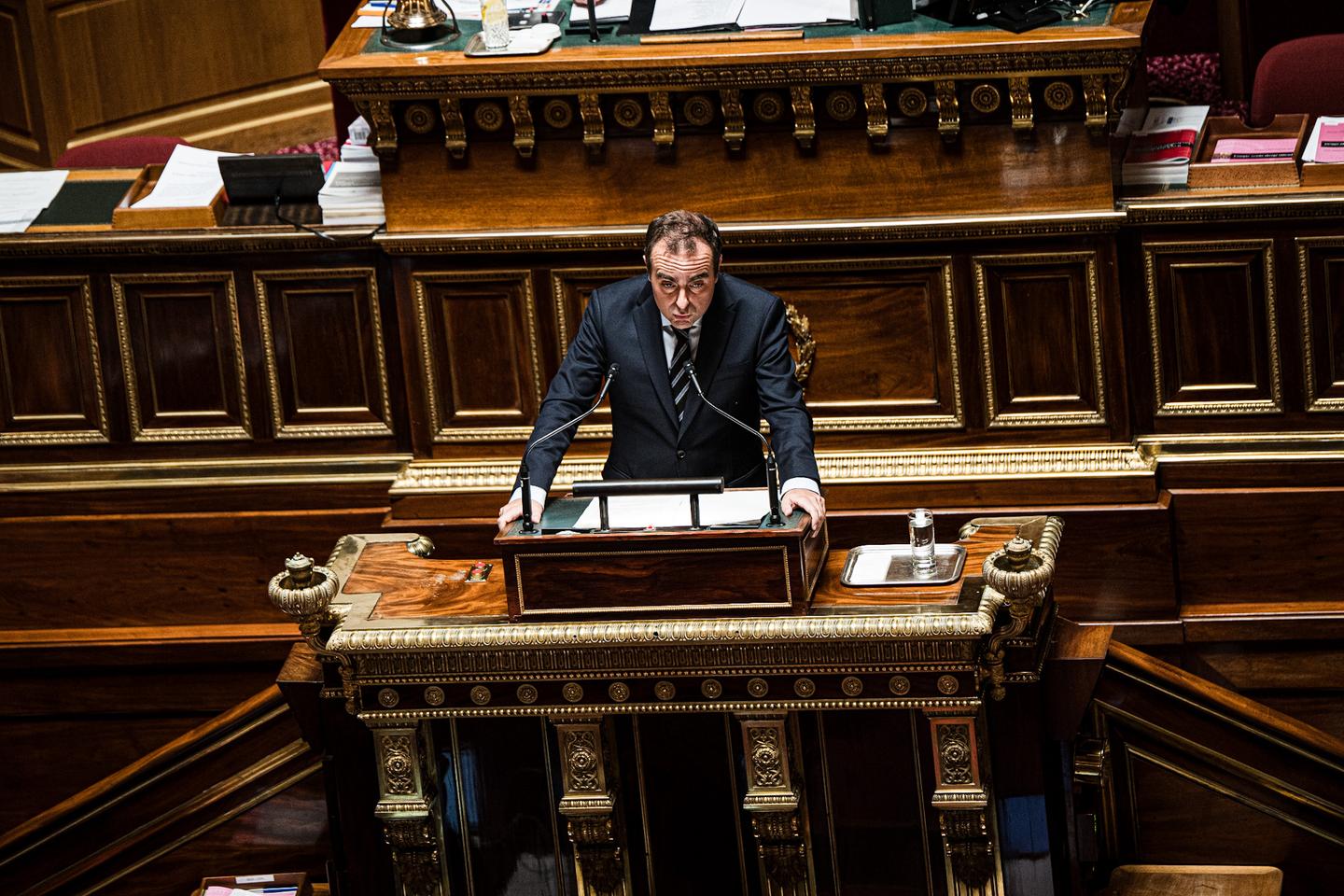 Prime Minister Sébastien Lecornu delivers his government policy statement, at the Sénat in Paris, on October 15, 2025. JULIEN MUGUET FOR LE MONDE
Prime Minister Sébastien Lecornu delivers his government policy statement, at the Sénat in Paris, on October 15, 2025. JULIEN MUGUET FOR LE MONDE
To save his government in a politically unstable France, Prime Minister Sébastien Lecornu on Tuesday, October 14, agreed to suspend the contentious 2023 pension reform for one year, “until the presidential election” in 2027. The measure had been a demand of the Socialists, whom Lecornu depends on to ensure his government’s survival. Hailing it as a “victory,” they pledged to, in return, not back the two no-confidence motions that were put to a vote in the Assemblée on Thursday, October 16.
Read more Subscribers only How France’s PM caved on the retirement age to save his government
While a suspension does not mean a repeal, it is nevertheless the first concession that Macron’s supporters have made on the reform, which has been strongly contested by opposition parties and labor unions even after it was passed in April 2023. Practically speaking, it would mean pausing the gradual raises of the legal retirement age (from 62 to 64) and of the “contribution period,” or, roughly, time spent working.
Yet, given the current political instability, will the suspension really go ahead? Who would be affected? What will the pension system look like after 2027? Here are five questions and answers to help clarify the situation.
Which pension reform is at issue?
The 2023 reform aimed to preserve the country’s pay-as-you-go pension system, in which mandatory contributions from workers (31 million people in 2023) fund the pensions of current retirees (17.2 million), in a context marked by budgetary challenges and a steadily aging population. It made two major changes:
The minimum retirement age was increased from 62 to 64.The raising of the “contribution period” required to qualify for retirement was accelerated to reach 43 years (172 quarters) in 2027 instead of 2035.
The bill also enshrined a gradual move to phase out several special pension plans and included more favorable provisions for certain categories of workers.
Two years after being adopted, the reform is still being rolled out, with its gradual implementation planned out until 2030. As of today, the legal minimum retirement age stands at 62 years and nine months, while the required contribution period is 42 and a half years, or 170 quarters.
Will the suspension really go ahead?
During a government question session on Wednesday, October 15, Lecornu said he intended to suspend the pension reform “until the presidential election” due to be held in 2027.
To make sure the suspension goes ahead, a parliamentary vote will be required. Lecornu therefore announced that, “in November,” an amendment would be added to the social security budget bill to include the suspension.
Partner service
Learn French with Gymglish
Thanks to a daily lesson, an original story and a personalized correction, in 15 minutes per day.
Try for free
Help us improve Le Monde in English
Dear reader,
We’d love to hear your thoughts on Le Monde in English! Take this quick survey to help us improve it for you.
Take the survey
New
Le Monde’s app
Get the most out of your experience: download the app to enjoy Le Monde in English anywhere, anytime
Download
The goal, according to him, was “to move as quickly as possible, with deadlines that are respected and a high-quality debate,” all while stressing that “without a corresponding revenue measure,” the suspension could not be passed. This was a way for the prime minister to put pressure on the opposition parties: If they do not vote through the budget bill, the pause in the pension reform will not go ahead.
Read more Subscribers only France’s new budget plan is ambitious but highly fragile
The other option for the government would be to enshrine the suspension in a separate bill, but this scenario opens the door to a tense political game of chess. If the bill were examined before the budget, the opposition could have it both ways, said economist Eric Heyer: securing the suspension while also rejecting the budget. If it were only reviewed after the social security budget is put to a vote, the government could secure its budget and then eventually decide to abandon the separate bill. It’s a “budget for suspension” bargain, said economist Michaël Zemmour, a lecturer at the Lumière Lyon 2 University who supported the left-wing alliance in the 2024 elections.
Who would be affected?
The suspension of the 2023 pension reform would theoretically affect French workers born between 1964 and 1968, or about 3.5 million people who are due to retire between 2026 and 2030. They could retire three months earlier than the timeframe initially provided for by the reform.
However, given that the presidential election is scheduled for April 2027, and that the suspension could then be lifted by the new governmen, only people born in 1964 would be guaranteed to be able to retire as early as October 2026, instead of January 2027, at the age of 62 years and nine months, if they have paid contributions over 170 quarters (instead of 171).
What about after 2027?
After the one-year suspension, the pension reform would resume in 2028, and the legal minimum retirement age would be set to reach 64 “in 2033 instead of 2032,” according to Zemmour. It will be up to the winner of the 2027 presidential election to either maintain the reform or propose a new reform to change the legal retirement age.
French workers born between 1965 and 1968, who are scheduled to retire between 2027 and 2030, will, therefore, depend on the choices made by the new majority after 2027. Ahead of that deadline, Lecornu has proposed to hold a conference between labor unions and employers’ organizations to discuss the future of the pension system by the spring of 2026, with a particular focus on securing its financial balance. He even suggested “entrusting” them with managing the system.
What impact will this have on the country’s public finances?
According to figures presented by Lecornu on Tuesday, suspending the pension reform would cost “€400 million in 2026 and €1.8 billion in 2027.” Allowing certain cohorts of workers to retire three months earlier, starting in 2026, would indeed result in “an extra quarter of pensions to be paid [by the state] and a quarter less of [employee] contributions received,” said Zemmour.
From a strictly budgetary point of view, this extra cost is relatively modest over the course of a year: The state’s spending is expected to reach about €500 billion next year, and the prime minister has planned €30 billion in budget savings.
Read more Subscribers only French parliament prepares for budget showdown like no other
But the suspension can even be seen as indirectly favorable for the public finances. Indeed, without the government and the Socialists reaching a compromise on this issue, the government would likely have collapsed, jeopardizing the chances of France adopting a 2026 budget and reducing its deficit. Not to mention the impact of political instability on the country’s economic activity and the financial markets’ confidence in France’s debt. “If the suspension of the reform allows the government to pass a budget, that’s a good deal, economically speaking,” said Zemmour.
The question of the pension system’s long-term financial balance remains. At this stage, the Finance Ministry has not yet calculated the cost of freezing the legal retirement age at 62 years and nine months if the suspension were to continue beyond 2027.
Translation of an original article published in French on lemonde.fr; the publisher may only be liable for the French version.

